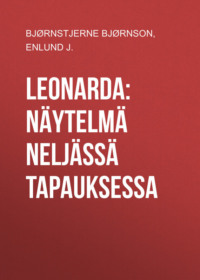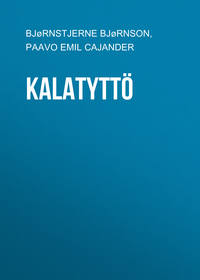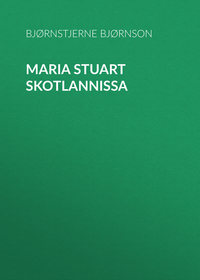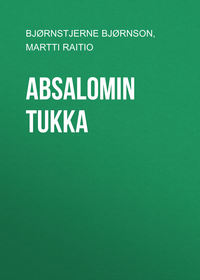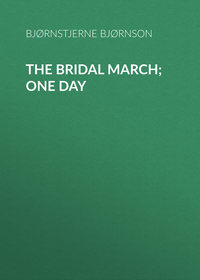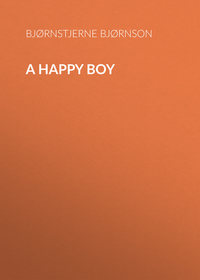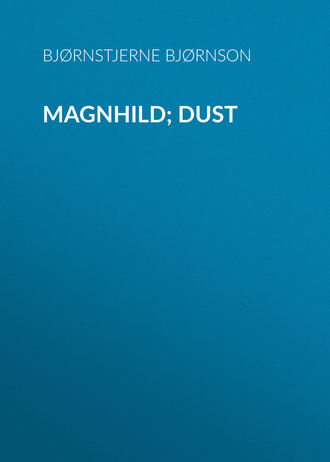 полная версия
полная версияMagnhild; Dust
"Did he try to use force?"
"That he has never done," said Magnhild; "no, there are other things" – and now she became so convulsed with weeping that Rönnaug said no more, but finished dressing both Magnhild and herself as quickly as possible. She hastened into the bed-chamber to awaken her American friend, then down-stairs to rouse the people of the hotel: she wanted to start within an hour.
She found Magnhild where she had left her.
"No, this will not do," said she. "Pray control yourself. Within an hour we must be away from here."
But Magnhild sat still; it was as though all her energy had been exhausted by the struggle and the resolve she had just come from. Rönnaug let her alone; she had as much as she could do to get ready. Everything was packed, and last of all the child was wrapped in its traveling blanket without being roused. Within an hour they and all their belongings were actually stowed away in the carriage.
The world around them slept. They drove onward in the bright, dawning morning, past the church. The sun was not visible; but the skies, above the mountains to the east, were flushed with roseate hues. The landscape lay in dark shadows, the upper slope of the mountains in the deepest of deep black-blue; the stream, not a streak of light over its struggle, cut its way along, like a procession of wild, angry mountaineers, recklessly dashing downward at this moment of the world's awakening, without consideration, without pausing for rest, and with shrill laughter at this mad resolve and the success which attended it.
The impressions of nature, and the feelings Magnhild might otherwise have experienced during this journey away from the griefs of many years, over the first miles, as it were, of a new career in the sumptuous traveling carriage of the friend of her childhood, – all were lulled into a weary, vapid drowsiness. Her daily life had been for years one monotonous routine, so that the emotions of a single evening had completely exhausted her strength. She longed now for nothing so much as for a bed. And Rönnaug, bent on fully carrying out the wonders of contrast, was not content with traveling in her own carriage with two horses (when the ascent began she would have four), she wanted also to sleep in one of the guest-beds at the post-station where she had once served. This wish was gratified, and three hours' sleep was taken by them all. The hostess recognized Rönnaug, but as she was a person Rönnaug had not liked, there was no conversation between them.
After they had slept, eaten, and settled their account, Rönnaug felt a desire to write something with her own hand in the traveler's register. That was indeed too amusing. She read what was last written there, as follows: "Two persons, one horse, change for the next station," and on the margin was added, —
"Birds encountered us two, tweewhitt!'With us to tarry, think you, tweewhitt?'"'We plan, we reason, no more, tra-ra!Each other we adore, tra-ra!'""What nonsense was this?" The rest of the party must see: it was translated into English for Betsy Roland. Now they remembered that as they drove into the station they had seen a carriage, with a gentleman and lady in it, driving quickly past them up the road. The gentleman had turned his face away, as though he did not wish to be seen; the lady was closely veiled.
They were still talking of this when they sat in the carriage and drove away, while all the people at the station had assembled to watch them. The travelers concluded that the verses must have been written by some happy new-married couple; and Magnhild, by one of those trains of thought which cannot be accounted for, called to mind the young couple, the gentleman in morocco slippers, and the lady with her hair so strangely done up, she had met at the next station, on her own wedding trip. This led her to recall her own wedding, then to think of what she had gone through in all these years, and of how aimless her whole life was, – aimless whether she looked into the past or into the future.
Day had meanwhile dawned in wondrous beauty. The sun had risen above the lofty mountains. The valley, although narrow, was so situated that it was thoroughly illumined by the sunshine. The stream now flowed in a narrower, more rocky bed, was white with foam where struggles arose, grass-green where they ceased, blue where there were overhanging shadows, and gray where the water formed eddies over a clay bottom. The grass here was filled with stubble, farther up it was studded with yellow cowslips, the largest they had ever seen.
The peaks of the mountains sparkled, the dark pine forest in the bosom and lap of the chain displayed such a wealth of luxuriance, that whoever viewed it aright must inevitably be refreshed. Close by the road-side grew deciduous trees, for here the pines had been cut down, yet ever and anon they pushed their way triumphantly forth from their vigorous headquarters in the background. The road was free from dust. On the outskirts of the forest grew mountain flowers, all glittering with the last dew-drops of the day.
The travelers had the carriage stop that they might pluck some of the flowers; and then they sat in the grass and amused the child with them; they wove garlands and twined them about the little one. A short distance farther up, where the stream had sunk so far beneath them that its roar had ceased to sound above all else, they heard the jubilant song of birds. The thrush, singly and in groups, swung from tree to tree, and its vigorous chirping had a cheering tone. A startled wood-grouse, with strong wing-beats, flew shrieking among the branches. A dog who followed the horses set chase to the red grouse; they shrieked, flapped their wings, hid in the heather, shrieked, started up again and sought a circuitous way back. They must have nests here. There was also a rich growth of birch round about this little heath.
"Ah, how I have longed for this journey! And Charles, who gave it to me!" The tears stood in Rönnaug's eyes, but she brushed them away, after she had kissed her child. "No, no tears. Why should there be any?"
And she sang: —
"Shed no tear! Oh shed no tear!The flower will bloom another year.Weep no more! Oh weep no more!Young buds sleep in the root's white core."3"This is our summer trip, Magnhild! The summer travels in Norway. Now onward!"
But Magnhild bowed down and covered her face with her hands.
"All shall be well with you, Magnhild. Charles is so good! He will do everything for you."
But here she heard Magnhild sob, and so she said no more.
The sunny day through which they rode onward, the fresh, aromatic mountain air they inhaled, the sounds of jubilee which burst forth from the forest, blending with childhood's memories, became too much for Rönnaug. She forgot Magnhild and began to sing again. Then she took the child and chatted playfully with it and with Miss Roland. She was surprised by Magnhild's asking: —
"Do you love your husband, Rönnaug?"
"Do I love him? Why, when Mr. Charles Randon said to me: 'I will gladly provide for your education, Rönnaug; I hope you will let me have this pleasure,' – well, I let him have the pleasure. When Mr. Charles said to me: 'My dear Rönnaug, I am much older than you; yet if you could consent to be my wife, I am certain that I should be happy,' – well – and so I made him happy. And when Mr. Charles said: 'My dear Rönnaug, take good care of our little Harry, so that I may find you all in Liverpool in September, and your Norwegian friend with you,' – why, I determined that he should find us all in Liverpool in September, and little Harry well and hearty; and my Norwegian friend along, too!" – and she kissed the child and set it to laughing.
They changed horses at the next post-station. Magnhild and Miss Roland kept their seats in the carriage. Rönnaug got out, partly to re-visit familiar haunts, partly to make an entry in the register. That was her duty, she said. Presently she came back, laughing, with the register. Under the entry: "Two persons for the next station," – indicating that these two persons were too much absorbed to even trouble themselves with the name of the next station, – were the following lines: —
"Love is all the budding flower,Perfect blossom, fruit mature.When breaking boughs no more endure,Then "stop!" is shrieked to Winter's power.Rather life to stop be driven;No alternative is given!"Rönnaug translated it for Betsy Roland, and now various conjectures were expressed by them all, in both Norwegian and English. They agreed in supposing the writers to be two lovers, on a journey, under peculiar circumstances; but whether they were a newly-married couple, or merely lovers; whether theirs was a runaway flight, or whether they were simply actuated by exuberance of spirits over happily overcome obstacles, or, – oh! there were manifold possibilities.
Rönnaug wished to copy the verses, and Magnhild offered her a leaf from her pocket-book. As this was produced a letter fell from it. Magnhild was surprised, but she soon remembered that she had received the letter by mail the evening before, an hour after her husband's arrival. Wholly absorbed in her conflict with him, she had placed it for the time in her pocket-book. She never received letters, so she could not imagine from whom this could come. The two travelers from America did not notice that the letter bore a foreign stamp, but Magnhild saw this at once. She tore open the letter; it was written in a delicate hand, on fine paper, and was quite long. It was headed "Munich," and the signature was – did she read aright? – "Hans Tande." She folded the letter again, without knowing what she was doing, while the hot blushes spread over face and neck. The two others acted as though they had observed nothing; Rönnaug busied herself with copying the verses.
They drove rapidly on, and left Magnhild to her reflections. But her embarrassment increased to such a degree that it became positive torture to her to sit in the carriage with the others. She meekly begged to be allowed to get out and walk a little distance. Rönnaug smiled and ordered the coachman to stop, – they had just reached a level plain where the horses could rest a while. When the travelers had alighted, she took Magnhild by the hand and led her toward a thicket a few steps behind them.
"Come – go in there now and read your letter!" said she.
When Magnhild found herself alone in the wood she stood still. Her agitation had compelled her to pause. She peered about her, as though fearing even in this lonely spot the presence of people. The sun played here and there on the yellow pine needles that were strewn about, on the fallen decayed branches, on the dark green moss covering the stones, on the heather in the glades. Around her all was profoundly still; from the sunny margin of the wood there floated toward her the twittering of a solitary bird, the babbling of the child, and Rönnaug's laughter, which rang with the utmost clearness through the trees.
Magnhild ventured to draw forth the letter once more. She opened it. It was not folded in the original creases. She spread it out before her, and looked at it as an aged woman might gaze into the depths of a chest upon her bridal garments. A solitary sunbeam, breaking through the branches, played restlessly on the sheet, and was now round, now oblong. Magnhild saw within its shining ring one word, two words, more distinctly than the rest. "Great hopes – and failed!" were written there. "Great hopes – and failed." She read and trembled. Alas! alas! alas! Over and over again she read the words, and felt rich in expectation, in dread, in memories of bliss and of conflict; she could not sit still, she rose to her feet, but only to sit down again to fresh efforts. The ringing tones of Rönnaug's laughter broke upon her solitude, like a staff, which she grasped for support. She gained courage from Rönnaug's courage, and looked here and there in the letter, not to read, rather to find out whether she dare read. But she was too agitated to connect the broken sentences, and was led, almost unawares, to a continuous perusal. She did not understand all that she read. Still it was a communion; it was like the warm clasp of a hand. There was music wafted about her, —his music; she was once more in his presence, with the rare perfume, the look, the embarrassed silence, amid which she had experienced earth's highest bliss. The diamond cut its shining circlets over the piano keys, his white, refined hand played "Flowers on the Green." Wholly under his influence now, she became absorbed in re-reading the letter, comprehended it better than before, paused, exulted without words, read, while the tears trickled down her cheeks. She paused, without being aware of it, simply because she could not see, began again, without perceiving it, wept profusely, read on, finished only to begin anew – three, four, five times from beginning to end. She could read no more.
What had she not experienced during this perusal of thoughts and feelings she had had a thousand times before, and thoughts and feelings she had never dreamed of!
The first complete impression she gathered, in the humid forest shades, where she sat concealed from view, was like a shaft of quivering sunbeams. It was the foreboding which stole over her – it was not put into words, and yet it was breathed from every line (a thousand times sweeter so!) the foreboding, aye, the certainty, that he, yes, that he had loved her! – and the second was that he had at the same time been fully aware of her love, long, long before she had grasped it herself! and he had not hinted at this by so much as a look. How considerate he had been! And yet, what must he not have seen in her heart! Was it true? Could it be true?
Ah! it was all one! And yet amidst her grief the thought of being able to feel all this to the core as he had felt, was like the sun shining behind a misty atmosphere and gradually bursting through the layers of fog with thousands of undreamed-of light effects, above and below. How freely she could breathe again after the void, privation, brooding of many years.
Not until later did individual thoughts force themselves forward, then not fully until Rönnaug came to her. There was something labored in this letter; it read occasionally like a translation from a foreign language. But now for the letter itself: —
I have just returned from the south. I thought myself strong enough. Alas! The papers have doubtless informed you that I am ill; but the papers do not know what I now know!
The first thing I do in this new certainty is to write to you, dear Magnhild.
You will, of course, be painfully surprised at the sight of my signature. I awakened great hopes – and failed when they should have been fulfilled.
A thousand times since I have thought how impossible it would be for you to go to the piano and try over some song we three had studied together, or some exercise we two had gone through. A miracle would have been needed to compel you to do so.
A thousand times I have considered whether I should write to you, and tell you what I must now tell you, that this has been the deepest sorrow of my life.
You set me free from a once rich, but afterward unworthy relation, and this was my salvation. The germ of innocence in my soul was once more released. The entire extent of my emancipation, however, I did not realize so long as we were together.
And I repaid you for what you had done for me by desolating your life, so far as lay within my power. But I have also yearned to tell you what I now believe: our destiny upon earth is not alone what we ourselves have recognized it to be, not alone what we believe to be the main purpose of our existences. When you, without being yourself conscious of it, gave me a purer, higher tendency, you were fulfilling a part of your destiny, dear Magnhild. It was perhaps a small part; but perhaps it was also only an hundredth part of still more which you had done for many others without so much as suspecting it yourself.
Magnhild, I can say it now without danger of being misinterpreted, and also without doing harm; for you have become four years and a half older and I am going hence; indeed, I believe it will help you to hear it. Well, then, the innocence in your soul had become, amidst your peculiar circumstances, a moral atmosphere which in you, more than in any one I ever met, proclaimed itself to be a power. It was all the more beautiful because so unconscious in its manifestations. It was breathed from every manifestation of your bashfulness. It revealed itself to me not alone in your blushes, Magnhild; no, in the tone of your voice also, in the immediate relations you held with every one you had intercourse with, or looked upon, or merely greeted. If there were those in your presence who were not pure, you made them appear abhorrent; you taught even the fallen ones what beauty there is in moral purity.
You have the fullest right to rejoice over what I say. Aye, may it bring you more than rejoicing! It is not well to brood over a lost vocation, Magnhild, and the letters I receive from Grong lead me to suppose that this is what you are now doing. One who does not attain the first or greatest object of his ambition ought not to sink into listless inactivity; for do we not thus check the development of the thousand-leaved destiny of the tree of life? May not even disappointment be part of this?
-(Five days later.)
Magnhild, I do not say this in self-justification. Every time I think of your singing I realize what I have repressed. It possessed a purity, untouched by passion, and that was why it moved with such exalting influence through my soul. The perfume of tender memories was in it, memories of my childhood, my mother, my good teacher, my first conceptions of music, my first yearning for love, or thirst for beauty. It also revived the first, pure tintings of life, those which had not yet become glaring, still less tainted.
I think of your singing artistically schooled, radiant with spirituality – what a revelation! And this I checked in its growth.
I bought while we were together some of the brooches made by your father. I showed them to no one. Under the circumstances it would have caused suspicion and consequent annoyance. But in those brooches I felt the family calling, Magnhild, the family work, which your talent should have further continued. In your father's work there is innocent fancy, patience, in its imperfections, as it were, a sigh of far more significant, undeveloped power.
Is all this now checked because your progress is checked, you who are the last of your family and without children? No, I cannot justify myself.
-(I have been again compelled to lay aside my pen for many days. Now I must try if I can finish.)
Let not the wrong I did to you, and thereby, alas, to many both in the present and in the future, be used by you as an excuse for never making further progress! You can, if you will, give free scope to whatever power there is within you, if not in one way, in another. And do this now; do it, also, because I implore you! You can make the burden of my fault less heavy for my thoughts, now in the last hours of my life.
Aye, while I write this it grows lighter. The kindness you, in spite of all, surely cherish toward me (I feel it!) sends me a greeting.
You will, so far as you can, rescue my life's work, where it failed to complete its efforts; you will build upon and improve, Magnhild!
You will, moreover, accept this request as a consolation?
-(I could proceed no farther. But to-day I am better.)
If what I have written helps to open the world once more to you, so that you can enter in and take hold of life's duties; aye, if all that you have either neglected or only half performed can come to attain the rank of links in life's problem, and thus become dear to you, – then it will do me good; remember this! Farewell!
Ah, yes, farewell! I have other letters to write, and cannot do much. Farewell!
Hans Tande.-(Eight days later.)
I copy in this letter to you the following lines from a letter to another: —
"It is not true that love is for every one the portal to life. Perchance it is not so for even half of those who attain real life.
"There are many whose lives are ruined by the loss of love, or by sacrificing everything to love. With some of them, perhaps, it could not have been otherwise (people are so different, circumstances excuse so much); but those whose existences I have seen thus blighted could unconditionally have gained the mastery over self and in the effort acquired a new power. Encouraged, however, by a class of literature and art whose short-sightedness proceeds from a maimed will, they neglected all attempts at gaining strength."
CHAPTER XI
Magnhild and Rönnaug came arm in arm out of the wood where Rönnaug had finally been obliged to seek her friend, where so many confidences had been made, so much discussed and considered. They emerged into the open plain. How blue the haze about the mountains! And this was the frame for the pine forest, the surrounding heather, and the plain with Miss Roland and the child. The latter were sitting on blue and red rugs near the carriage. From this foreground the mother's eye wandered away more musingly than ever, and gained even stronger impressions of outline, light, color.
"The summer travels in Norway! The summer travels in Norway!" she kept saying to herself.
From the way in which she uttered these words it might be surmised that in the entire English vocabulary there was nothing which admitted of being repeated with such varied shades of meaning.
The two friends took a long ramble. Magnhild had become a new being to Rönnaug, her individuality enriched, her countenance illumined and thus transformed. For nearly five years Magnhild had been secretly brooding over her lost vocation, and her lost love, those two sisters that had lived and died together. At length she had opened her heart to another; thus something had been accomplished.
The horses were now hitched to the carriage, and the party drove on. The noonday repose of nature was not disturbed by so much as the rumbling of the wheels, for the carriage wound its way slowly over the mountain slopes.
At the next post-station the following lines were found in the register: —
"There met us croaking ravens on our way:We knew that Evil this to us did bode;We made no off'rings, though, as on we rode,To angry gods – the mild are fall of doubt.Why should we care? One God to us feels kindly.He is with us! And Him we follow blindly: —We laugh at all the omens round about."These little verses began to affect the party like a chorus of birds.
But a joy to which we are unattuned is apt to jar; and here, moreover, the verses became prophetic, for the travelers had gone but a short distance when they gained a view of the church steeple on the heights where Magnhild's parents and brothers and sisters were buried, and of the stony ground in the mountain to the left where the home of her childhood had been situated.
This barren patch of stones always rose up distinctly in Magnhild's mind when she thought of her own life, whose long desert wastes seemed to lay stretched out before her like just such a heap of ruins. Here it faced her once more. It was some time before the consolation she had newly grasped could find expression, for she was haunted by so much that was unsolved, so much that was doubtful. She was now approaching the starting-point of the whole; from the brow of the hill the parsonage was visible.
It had been agreed that they should stop here. The carriage rolled down toward the friendly gard through an avenue of birch-trees. Rönnaug was giving Miss Roland a most humorous description of the family at the parsonage when suddenly they were all terrified by having the carriage nearly upset. Just by the turn near the house-steps the coachman had driven against a large stone which lay with its lower side protruding into the road. Both Rönnaug and Miss Roland uttered a little shriek, but when they escaped without an accident they laughed. To their delight Magnhild joined in their laughter. Trifling as had been the occurrence, it had served to rouse her. She was surprised to find herself at the parsonage. And this stone? Ah, how many hundred vehicles had not driven over it! Would it ever be removed, though? There stood old Andreas, old Sören, old Knut? There, too, was old Ane, looking out! From the sitting-room came the sound of a dog's bark.


